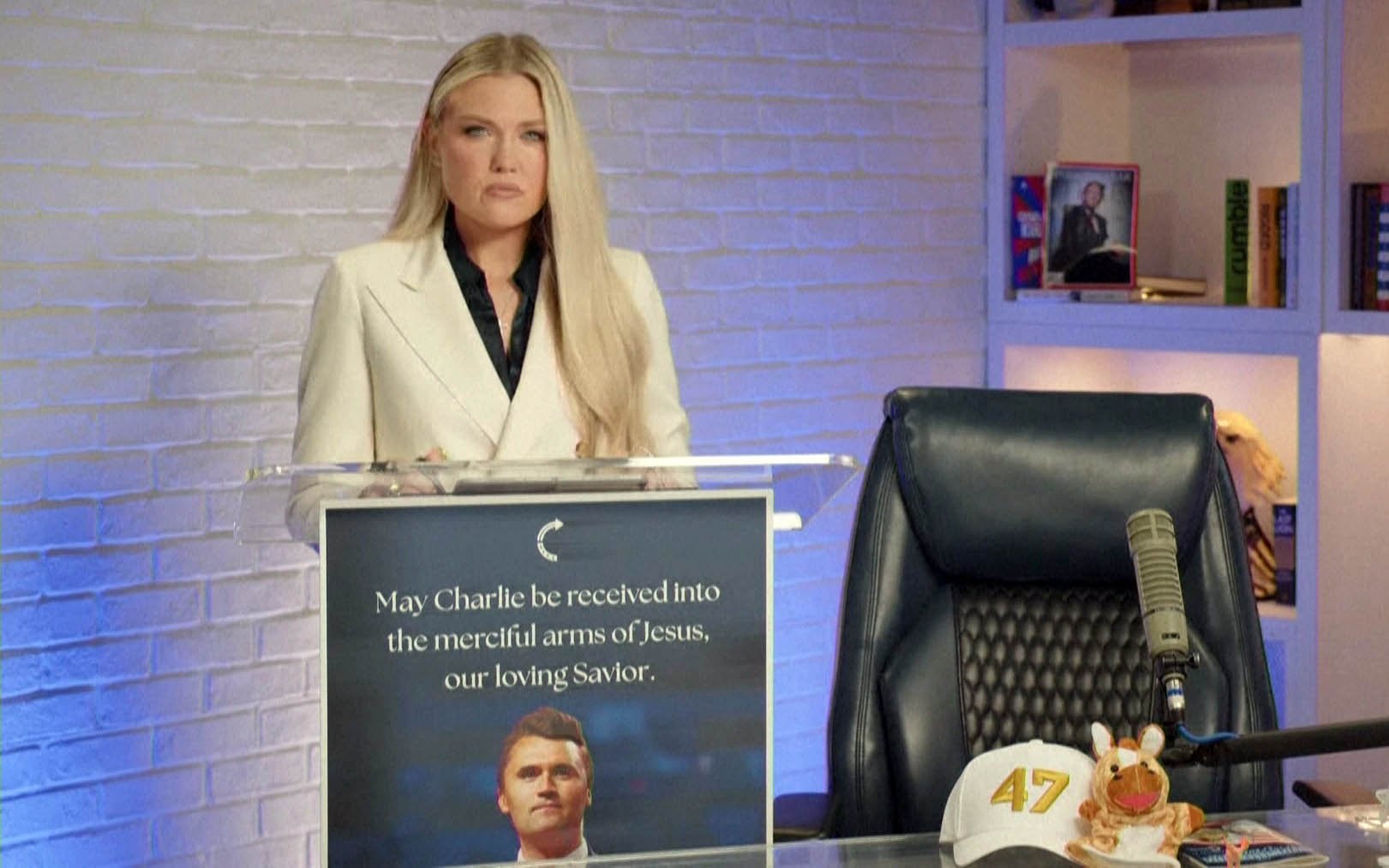Charlie Kirk’s Widow Issues Battle Cry:My Cries Will Echo Around the World

‘I will never let your legacy die’ – Charlie Kirk’s widow gives a tearful address after shooting. Today we will discuss about Charlie Kirk’s Widow Issues Battle Cry:My Cries Will Echo Around the World
Charlie Kirk’s Widow Issues Battle Cry:My Cries Will Echo Around the World
On a somber but defiant evening, Erika Kirk, widow of conservative activist Charlie Kirk, stepped into the public spotlight with a promise that would reverberate far beyond grief. Her words—“the cries of this widow will echo around the world like a battle cry”—mark both a personal lament and a rallying call. They ring out in the wake of tragedy, but also in the name of continuation, legacy, and resistance.
The Tragedy that Sparked the Cry

Charlie Kirk, the co-founder of Turning Point USA and a polarizing figure in American right-wing politics, was shot and killed while speaking at an event at Utah Valley University on Wednesday, September 10, 2025.
At 31, Kirk had amassed influence among young conservatives via campus tours, media appearances, podcasts, and a leadership profile that intertwined faith, politics, and activism. The event where he was killed was the first stop of what had been promoted as his autumn campus tour. His widow’s public remarks came shortly thereafter.
Erika Kirk’s Response: Grief, Defiance, and Vision
Erika Kirk addressed the nation in a video statement from her husband’s podcast studio. Her tone combined sorrow, staunch resolve, and an unambiguous conviction that his mission would not die with him. She vowed to continue the work of Turning Point USA — the campus tour, scheduled events like AmericaFest in December, and the media platforms he used.
Her words drew sharply at those she held responsible, those she termed “evil-doers,” saying:
“You have no idea what you just have unleashed across the country and this world.”
“If you thought that my husband’s mission was powerful before, you have no idea what you just unleashed.”
Erika emphasized that Charlie had been killed for preaching messages of patriotism, faith, and what she described as “God’s merciful love.” She framed his work not just as activism or politics, but as part of a spiritual struggle.
“My Cries Will Echo Around the World Like a Battle Cry”
Perhaps the most striking line of Erika’s address was the metaphor of grief becoming resistance:
“The cries of this widow will echo around the world like a battle cry.”
This statement accomplishes several rhetorical purposes:
Transforming personal pain into collective impetus — Erika turns her mourning into a call to action, inviting others to share in her grief and transform it into something mobilized.
Underscoring permanence — “Echo around the world” suggests her message will outlast this moment.
Mobilizing activism — the idea of a “battle cry” evokes engagement, resistance, reinforcing that this is not a private loss but a public cause.
Legacy & Vision: What Will Continue
In her speech, Erika made clear what will carry forward:
Turning Point USA’s Activities will continue. Both the campus tour and major events like AmericaFest are to proceed as scheduled.
Media Outlets: Charlie’s podcasts and radio show, which had wide reach, still have life.
Values and Emphasis: Faith, family, patriotism, and Christian beliefs were central: Erika said that if Charlie had run for office, his focus would have been on reviving the American family and encouraging young people toward faith and family life.
Erika also expressed gratitude — to law enforcement, those who worked to arrest the suspect (Tyler Robinson, 22) in connection with the shooting, and to supporters including prominent political figures such as JD Vance and former President Donald Trump.
Context: Charlie Kirk’s Influence & Controversy
To understand why Erika’s words carry such weight, one must consider Charlie Kirk’s polarizing public role:
Turning Point USA: Founded in 2012, its mission has been to mobilize young conservatives, particularly on college campuses. Kirk was a prominent voice in this push.
Rhetoric & Beliefs: He often combined evangelical Christianity with conservative political causes: opposing progressive social policies, arguing against separation of church and state, claiming there is a spiritual dimension to cultural and political battles (against what he and others called “wokeism,” Marxism, etc.).
Polarization & Criticism: Kirk was strongly criticized by opponents for inflammatory statements about issues like gender, race, immigration, and religion. His supporters saw him as a truth-speaker challenging liberal orthodoxy; critics saw him as pushing divisive rhetoric. The wide reach of his media and activism amplified both the admiration and the critique.
The Suspect, The Legal Aftermath, & Public Reaction
Following the shooting, Utah authorities arrested Tyler Robinson, a 22-year-old, on suspicion of aggravated murder and related charges.
Erika Kirk publicly thanked law enforcement for the arrest. While many responded with shock, sorrow, and sympathy, the event has also triggered broader debate about political violence, the role of rhetoric in inflamed social divisions, and what safety for public speakers looks like in America.
The Battle Lines: Spiritual Warfare & Political Conflict
Erika cast her husband’s mission as not merely political, but spiritual. She said:
“Spiritual warfare is palpable.”
This framing is typical of a long tradition of political mobilization within evangelical conservatism in the U.S., wherein cultural, moral, and societal debates are often projected into spiritual terms: good vs evil, faith vs secularism, righteousness vs corruption. For many supporters, this perspective deepens the stakes: it’s not just policy that matters, but cosmology and morality.
Erika’s narrative also draws on martyr imagery: she said Charlie will “now and for all eternity stand at his Savior’s side wearing the glorious crown of a martyr.”
Implications & Challenges
Erika’s pronouncement and promise raise many implications and challenges. Here are key ones:
Mobilization & Momentum: Can Turning Point USA sustain momentum without its charismatic founder? Leadership transitions in politicized movements are often precarious, especially when the founder is deeply woven into the identity of the movement.
Risk of Radicalization: The language used is martial and apocalyptic in tone. For some, this can amplify resolve; for others, it risks feeding further polarization or even incitement if not carefully managed.
Public Perception & Media: How Erika’s message is received — by supporters, by critics, and by neutral observers — will affect whether the promise of “stronger, louder, greater than ever” becomes sustainable or becomes contested.
Legal & Security Repercussions: The act of assassination or political violence forces public and legal scrutiny. It raises issues of free speech, protection of public figures, security at political or campus events, and mental health and extremism monitoring of individuals.
Legacy vs. Evolution: Can the movement evolve while holding true to its core tenets? What becomes of Charlie Kirk’s more controversial views or rhetoric under new leadership? Will Erika seek to refine, double down, or moderate?
Broader Reflections: America’s Fraying Civil Discourse
This incident is one among several in recent years where political violence, or the threat thereof, has escalated. It underscores how contentious public life in the United States has become. The killing of someone as high-profile as Charlie Kirk pushes larger questions:
The safety of public figures, especially those who polarize public opinion.
The role of moral and religious rhetoric in politics: when people frame ideological opposition as spiritual “evil,” what are the downstream effects?
The fissure between free speech and hateful or inflammatory speech — when does robust debate become harmful?
The desire among many for meaning beyond partisan identity: for many of Kirk’s followers, his activism was intertwined with faith, culture, belonging, purpose.
Erika’s evokes these broader themes by appealing to young people: urging students to start Turning Point USA chapters, emphasizing Christian faith and family, and calling for the revival of America’s moral and spiritual values.
Erika Kirk’s Place: Widow, Leader, Symbol
Erika stands at a complex intersection: she is at once grieving spouse, mother, public figure thrust into leadership, and symbol to a movement.
Her words and demeanor already suggest:
Stepping into leadership: She indicates willingness and intention to take an active role in sustaining Turning Point USA.
Personal sacrifice: The emotional cost is immediate and obvious. She refers to her husband’s death as a loss not just of partner, but of the person she knew — idealistic, driven, father, husband.
Moral authority: By invoking faith and invoking the imagery of martyrdom, she elevates her husband’s cause into a moral frame that resonates among his supporters.
However, this also puts Erika in a difficult position: navigating public expectations, political polarization, personal safety, and the need to maintain cohesion in a movement that could fragment without its founder.
The Global Echo
What does it mean that her cries will “echo around the world”?
Transnational appeal: Conservative movements globally have often followed or borrowed from U.S. conservative activism. For example, the intersections of evangelical faith and populist nationalism are not unique to the U.S. Events like this can become touchstones in other countries.
Media amplification: In the age of social media, livestreaming, podcasts — messages can spread quickly. A compelling or dramatic speech can reach multinational audiences, shaping discourse elsewhere.
Symbolic power: Tragedy often magnifies influence. Martyrdom can elevate a figure beyond what biography alone might have allowed. The symbolism of someone killed while speaking their message, followed by a vow from loved ones to continue, often becomes part of mythos.
Polarizing narratives: For supporters and opponents alike, such events sharpen lines. In many ways, Erika’s speech is destined to be interpreted differently across ideological divides — as courage, as holy resolve, or as furthering division.
What’s Next: Questions and Possibilities
As this situation unfolds, important questions arise, and several possible trajectories emerge:
Leadership Transition & Institutional Stability: How will Turning Point USA manage internal leadership without Charlie? Will there be co-leaders, board governance, or will Erika serve in a central role?
Message Shaping: Will the movement double down on the more combative rhetoric, or attempt to broaden its appeal? Will Erika lean toward moderating some of the more controversial statements her husband was known for?
Security and Public Event Safety: Will there be increased security at campus tours and public lectures? Might this event lead to legislative or institutional responses regarding protection for public speakers?
Legal Progress & Justice: The suspect’s case will draw attention. How it’s prosecuted, what charges are filed, whether political motivation is established or alleged, will impact public discourse.
Healing vs. Polarization: Will Erika’s call foster unity among conservatives, or will it deepen divides in American politics? Will moments of tragedy lead to introspection across the political spectrum, or will they be leveraged for further conflict?
Conclusion
Erika Kirk’s words—“the cries of this widow will echo around the world like a battle cry”—are more than an expression of grief. They are a vow: that her husband’s vision will carry forward. In her speech lies a roadmap of legacy: Turning Point USA’s continuity, persistent activism, and a refusal to yield.
At the intersection of mourning and determination, public tragedy and personal resolve, Erika has become part of Charlie Kirk’s legacy in a new way—one where her voice, in its pain, becomes leadership. Whether the echo she promises becomes a lasting chorus will depend not just on her strength but on that of the movement she now embodies, the culture of politics in which it lives, and the responses of both supporters and critics.
How useful was this post?
Click on a star to rate it!
Average rating 0 / 5. Vote count: 0
No votes so far! Be the first to rate this post.
About the Author
usa5911.com
Administrator
Hi, I’m Gurdeep Singh, a professional content writer from India with over 3 years of experience in the field. I specialize in covering U.S. politics, delivering timely and engaging content tailored specifically for an American audience. Along with my dedicated team, we track and report on all the latest political trends, news, and in-depth analysis shaping the United States today. Our goal is to provide clear, factual, and compelling content that keeps readers informed and engaged with the ever-changing political landscape.




